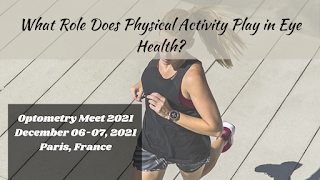What Role Does Physical Activity Play in Eye Health?

We keep in shape, feel healthier, and get stronger by eating correctly, getting adequate sleep, and exercising on a regular basis. We can lower our risk of chronic health problems like type 2 diabetes, high blood pressure, and heart disease, but one of the lesser-known benefits of a healthy lifestyle is how it affects our long-term eye health . Sedentary Lifestyles Increase the Risk of Eye Disease Let's start by looking at what can happen to our eyes if we don't stay active. As we age, it actually makes us more vulnerable to visual loss. Those chronic health issues we described before might have a significant impact on our vision. Diabetic retinopathy , diabetic macular edema, and glaucoma are all risk factors for cataracts, diabetic retinopathy, diabetic macular edema, and glaucoma. Our eyes (along with the rest of our immune system) won't have the finest weapons to protect against infection if we don't obtain the necessary nutrients from a balanced diet or get enough ...

